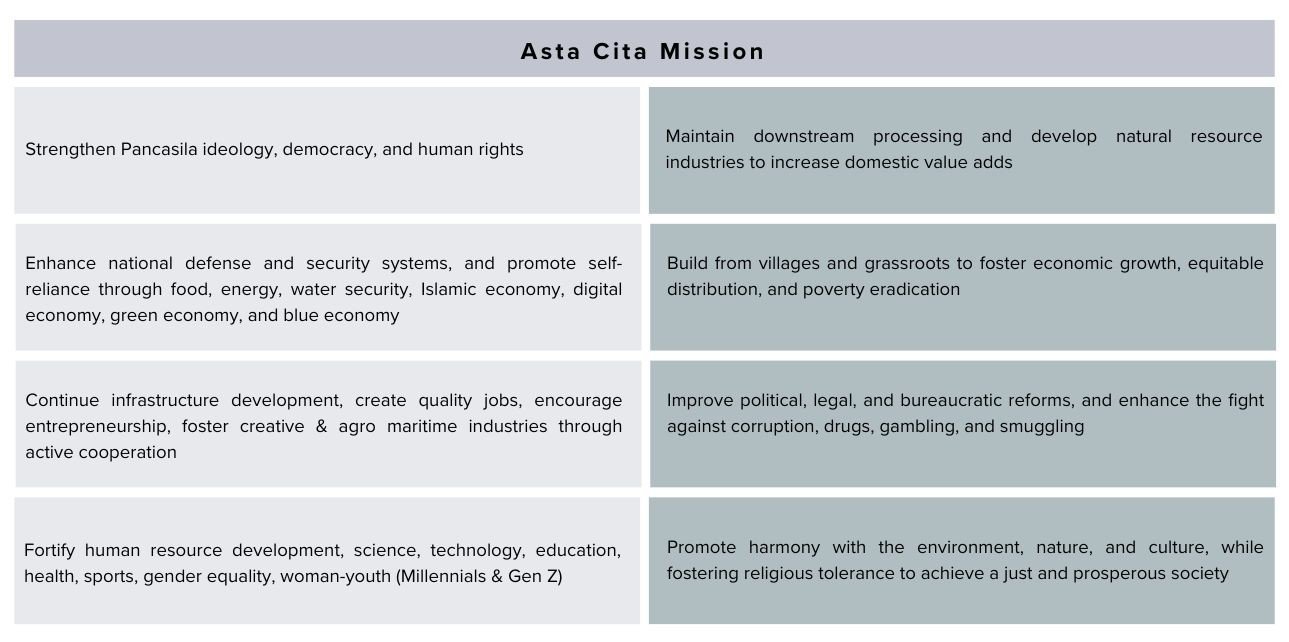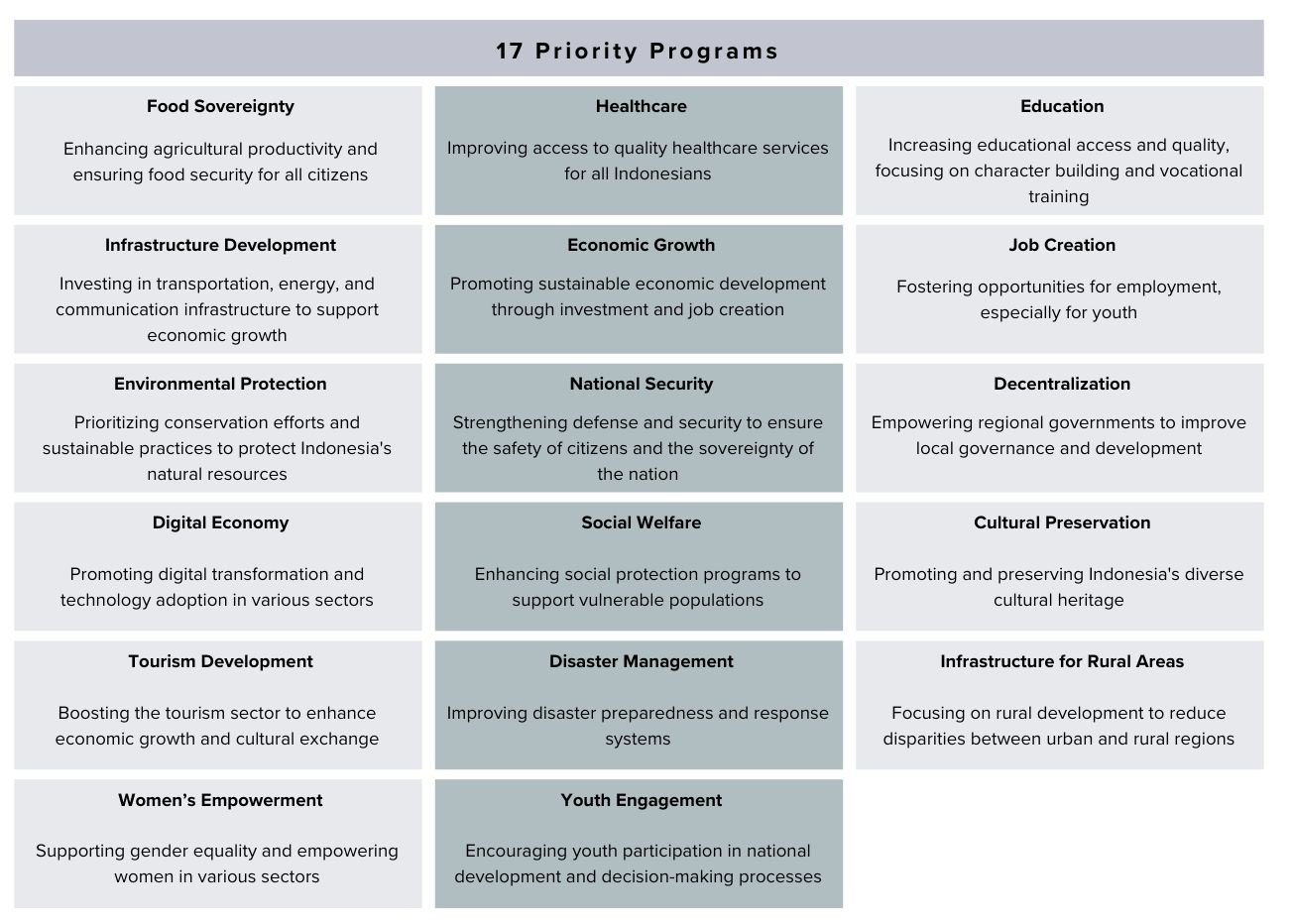The New Presidential Administration: Navigating Indonesia’s Leadership Shift and Prospect for National Progress
Authors
As Indonesia sets its sights on a future marked by progress and transformation, the recent inauguration of President Prabowo Subianto on 20 October 2024, heralds a renewed sense of purpose for the nation.
In this ARMA Update, we outline the new administration’s strategic priorities and key initiatives aimed at addressing the country’s critical challenges and long-term aspirations. Additionally, we highlight the formation of the "Merah Putih" cabinet, focusing on how this leadership team aligns with President Prabowo's agenda for national progress and fostering unity.
Asta Cita Missions
At the core of President Prabowo’s leadership are the 8 Asta Cita Missions, a strategic framework comprising eight key aspirations aimed at steering Indonesia towards sustainable growth and unity. These missions emphasize the importance of resilience, economic development, and national solidarity. Below is a detailed overview of the 8 Asta Cita Missions:

17 Priority Programs
As part of his agenda, President Prabowo outlined 17 Priority Programs, focusing on key areas of governance to enhance Indonesia’s development and improve the well-being of its people. These programs include:

Merah Putih Cabinet
President Prabowo has introduced the Merah Putih Cabinet (Red and White – the colors of the Indonesian flag), symbolizing national pride and unity. On 21 October 2024, President Prabowo inaugurated 48 ministers for this newly formed cabinet. The structure of the cabinet is defined in Presidential Regulation Number 140 of 2024, which governs the Organization of State Ministries.
The Merah Putih Cabinet reflects a significant increase in the number of ministries, indicating a restructuring and the establishment of new ministries to address emerging priorities. Below is a complete list of the ministries included in the Merah Putih Cabinet:

Key Work Programs for Business Stakeholders
As previously mentioned, the new administration has articulated 8 (eight) missions, collectively referred to as Asta Cita. There are several work program ideas that are the embodiment of the Asta Cita that are important for business actors to pay attention to. Here are some of the insights:
1. Public Private People Partnership (PPPP) Scheme
Slightly different from the well-known Public Private Partnership (PPP) schemes, the Prabowo government has introduced the PPPP scheme. As the name suggests, the PPPP scheme will involve community elements and is intended to provide benefits to the people. Several government programs planned to utilize the PPPP scheme are as follows:
-
Rehabilitation of degraded forests into natural forests, Industrial Plantation Forests (HTI), and production forests,
-
Development of a fishing fleet to serve the deep-sea areas within the Exclusive Economic Zone (EEZ), and
-
Construction of sports infrastructure.
2. Energy Self-Sufficiency
In line with achieving the Net Zero Emission target, the Prabowo government has declared its vision for Indonesia to become the World's Green Energy Leader. To achieve this goal, several key initiatives have been proposed, including:
-
Reducing dependence on fossil fuels and prioritizing the use of new and renewable energy sources, as well as bio-based energy;
-
Enhancing incentive schemes to promote the discovery of new energy reserves, thereby strengthening national energy resilience and sovereignty; and
-
Revising all regulatory frameworks that hinder new investments in the new and renewable energy (NRE) sector.
3. Green Economy
The new administration prioritizes the development of a green economic climate in Indonesia. The Ministry of Environment/Environmental Agency, which now operates as a separate entity, is expected to serve as the primary institution ensuring the successful implementation of a green economy in the country. Several key initiatives in the field of the green economy are as follows:
-
Implementation of sustainable natural resource management standards through a certification system for products derived from environmentally friendly resource management practices;
-
Acceleration of decarbonization plans to achieve the net zero emission target;
-
Acceleration of the utilization and development of natural resources related to carbon sinks and carbon offsets to expedite the net zero emission target;
-
A program to decommission coal-fired power plants; and
-
Development of biodiesel, bioavtur, and bioethanol programs.
4. Downstream
With the spirit of continuity from the Joko Widodo administration, the Prabowo government will continue to advance downstream industrialization programs. These programs are expected to create new economic growth centers. The key initiatives include:
-
Increasing the value of the domestic content level (Tingkat Komponen Dalam Negeri);
-
Promoting industrialization and downstream processing in various sectors through the construction of factories, smelters, and similar facilities;
-
Developing innovative financing programs to attract foreign investors;
-
Constructing export-import ports and international transshipment hubs; and
-
Standardizing infrastructure and facilities at all key ports and airports.
5. Legal and Governance Reform
In addition to its economic initiatives, the Prabowo government has proposed several reforms in the areas of law and governance, including the following:
-
Establishment of a land bank with a moratorium on expired land use rights (Hak Guna Usaha) and building use rights (Hak Guna Bangunan);
-
Review of regulations concerning residential zoning in urban areas;
-
Revitalization of supervisory functions through the development of independent and accountable inspectorates, and oversight of tax revenue leaks, combined with a bankable financial transaction system and cashless payments;
-
Increasing the non-taxable income (Pendapatan Tidak Kena Pajak) threshold and reducing the income tax (Pajak Penghasilan) 21 tax rates to stimulate economic activity and increase the tax ratio;
-
Exemption from taxes for the first two years for newly established and officially registered Micro, Small, and Medium Enterprises (MSMEs) (Usaha Mikro, Kecil, dan Menengah); and
-
Provision of incentives for the book industry by abolishing VAT (Pajak Pertambahan Nilai) on all types of books and making book royalties subject to a final tax.
Disclaimer:
This client update is the property of ARMA Law and intended for providing general information and should not be treated as legal advice, nor shall it be relied upon by any party for any circumstance. ARMA Law has no intention to provide a specific legal advice with regard to this client update.
Related Updates
Latest Updates


